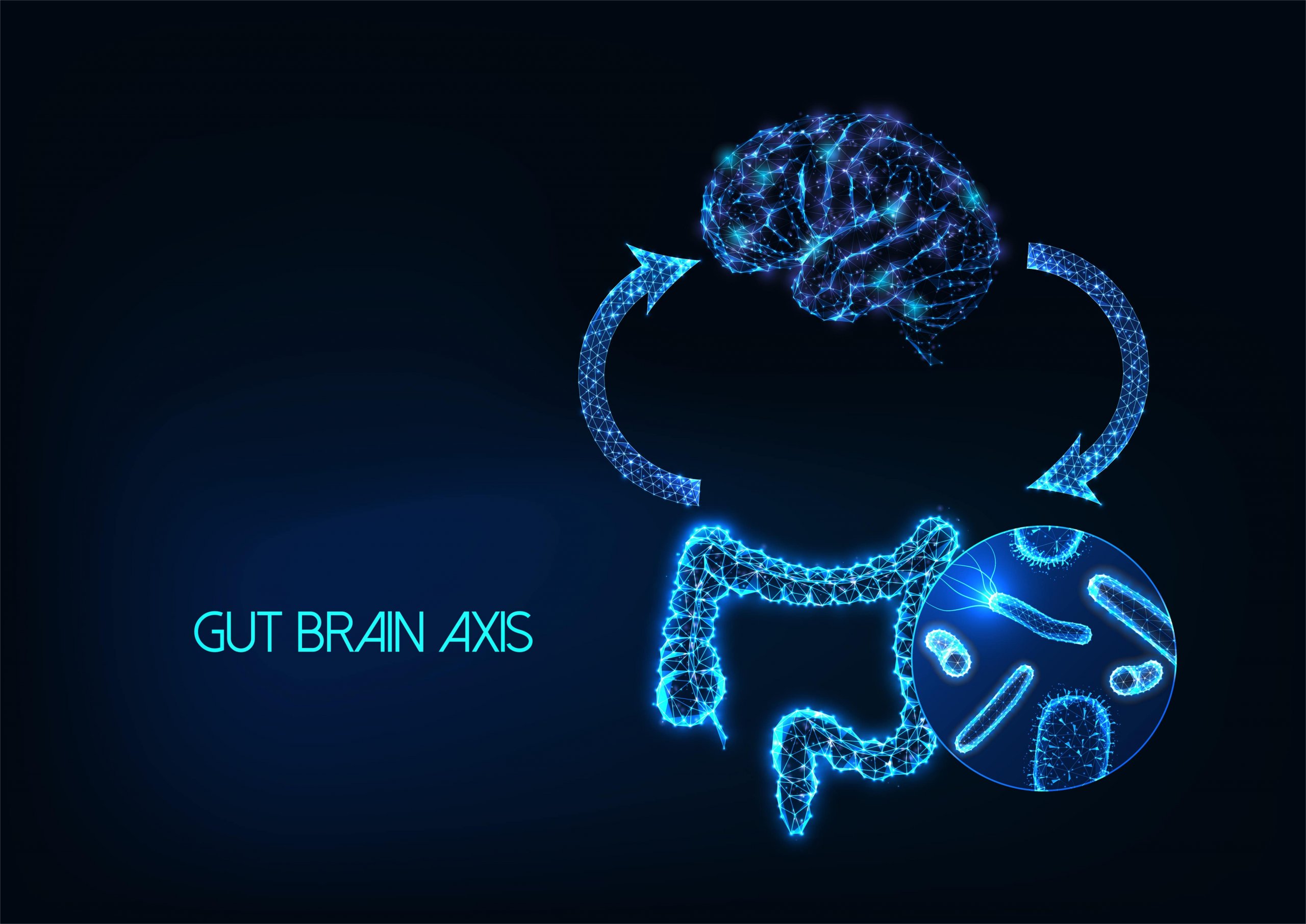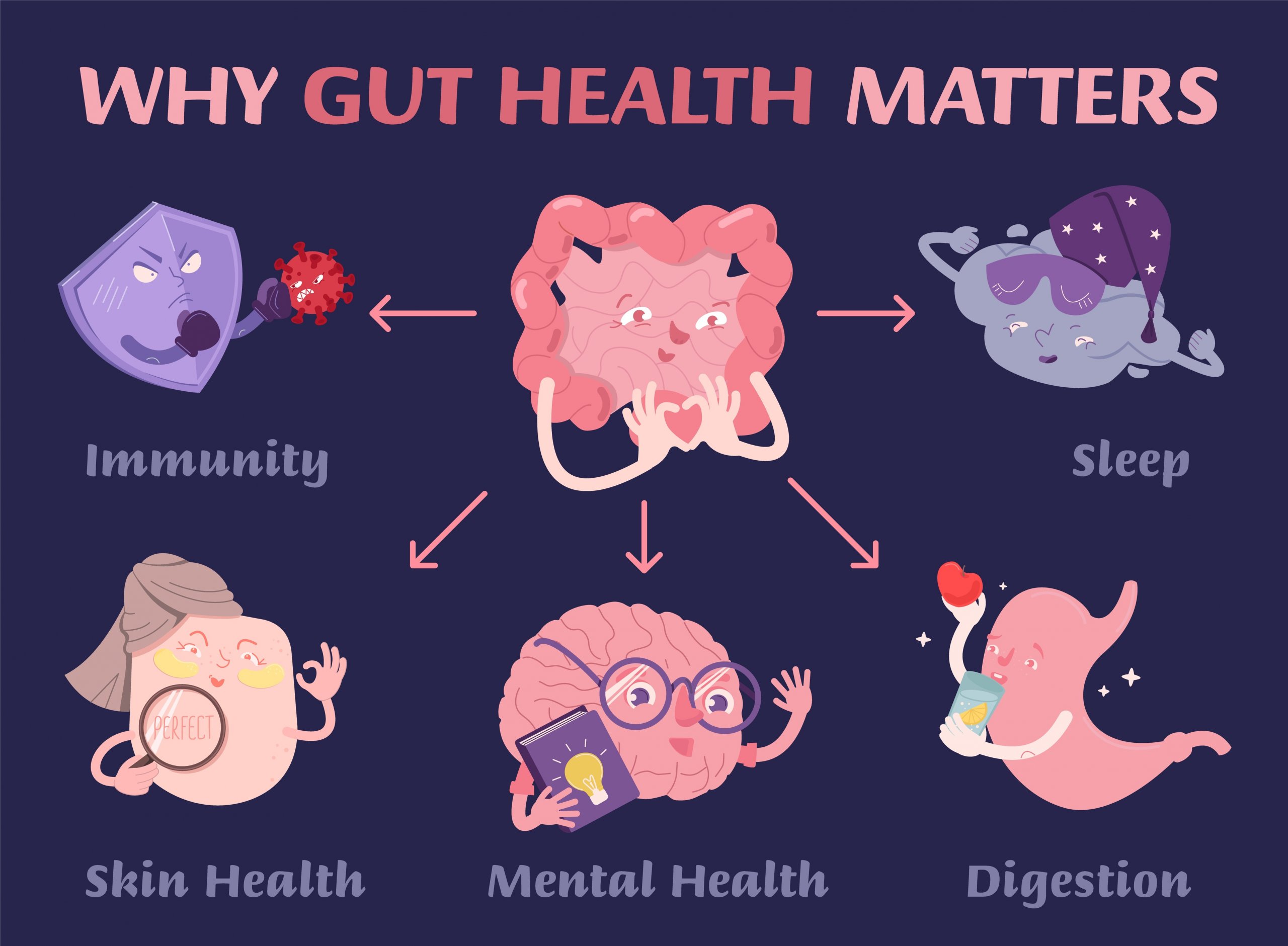Why do we need sleep? An intriguing question. It turns out all species sleep. Flamingos might do so with one leg standing, sharks with both eyes open, and certain seabirds might catch some z’s while literally flying. But a snooze is a snooze no matter how you slice it.
Even bacteria might “sleep” — not in the conventional sense of the word, but in regard to having natural biorhythms to their day called circadian rhythms under the influence of both internal and external cues (light and food intermittent streams). [1]
Which brings us to the topic at hand: the Gut Microbiome-Sleep Axis.
How might the gut of all places be involved in sleep? And what role do bacteria play? As it turns out, the gut-brain axis — as explored in another Supergut blog post — is involved in a number of key brain-body functions including the regulation of mood, energy, and, yes, even sleep.
On a Highway to Health

There is a communication highway — consisting of nerves (the vagus nerve), molecules, and immune cells — that keeps the gut microbes and brain in sync. When they’re out of sync, this can lead to sleep dysregulation, mood disorders, and even metabolic dysregulation. When they’re in sync, however, this can mean wonders for your overall metabolic and mental wellbeing.
So, what does the literature say? There are a number of great reviews on the topic that explore the ins and outs of the gut-sleep axis. [2, 3, 4, 5, 6] Most of this work has been done with animal models (experiments with rats and mice), but the findings are consistent: Disrupting sleep profoundly affects the composition of the microbiome.
What’s more interesting, however, is that the pathway works the other way around, too!
Both the timing [7] and the composition of your eating habits are critical for establishing healthy sleep cycles.
In other words, what you eat can influence how you sleep. And one of the best types of food for improving your sleep is the same type of food you’re probably not getting enough of in your diet: FIBER!
More Fiber for Better Sleep?
That’s right — a handful of animal-model studies have shown that providing more dietary fiber and more butyrate (a metabolite released during fiber’s microbial transformation in the gut) can have a fundamental effect on sleep cycles. [8, 9]
In fact, providing one or the other increases non-REM sleep by as much as 70%. It may also increase REM sleep and decrease the time it takes to fall asleep.
Talk about a pretty powerful punch for such a simple solution!
Healthier Gut, Improved Sleep: How It Works

But how does this work you might ask? One way is by feeding the gut microbiome. Microbes take fiber and convert it to metabolites like butyrate. Butyrate decreases inflammation, promotes brain health, and improves sleep.
Gut microbes also make precursors to neurotransmitters like gaba and serotonin which play a calming role in the peripheral and central nervous system. [10, 11] In fact, many of the antidepressants on the market work by also increasing serotonin availability to neurons.
So, a simple shorthand for how dietary fiber helps improve sleep is this:
More Fiber → Happier Microbes → Healthier Gut → Improved Gut-Brain Connection → Better Sleep
Gut-Sleep Axis: Evidence in Humans?
So, what about humans you might ask. Well, truth be told, the studies to date are more in the realm of correlation rather than causation. But there are a number of encouraging human studies that suggest a balanced microbiome actually correlates with better sleep (which, of course, aligns with the animal model findings).
Some human studies compare sleep patterns for groups of folks across various life stages (children, young adults, and elderly), and suggest more microbial diversity is associated with better sleep quality. Other studies show that some sleep disorders might be due to a decrease in certain key microbe species like Bifidobacterium and good Clostridium (which are the ones that make short chain fatty acids like butyrate). [12, 13, 14, 15]
Beyond correlation, there are a few completed and ongoing human intervention studies that suggest interventions like fiber might be impactful for sleep. One review that looked at a compilation of different studies evaluating the health impact of the Mediterranean diet found that sleep was one of the health parameters that significantly improved. [16]
Opting for a High-Fiber Diet for Better Sleep

The Mediterranean diet is very likely effective because it’s high in the Four Phonetic F’s of Food: fiber, polyphenols, good fats, and fermented foods. It’s possible that all of these dietary components are positively contributing, not just fiber. But there are also other studies evaluating fiber’s impact specifically.
For example, one study showed that stress hormones that interfere with sleep (cortisol) were significantly lower in volunteers that consumed a prebiotic fiber called GOS. [17] Another, which is currently ongoing, evaluates the potentially positive impact of a fiber mix on sleep. [18] Lastly, another recent study conducted by Supergut has shown an intriguing early signal of improved sleep in folks with diabetes after consuming a blend of prebiotic fibers, like beta glucan and resistant starch. [19]
So next time you’re tossing and turning and can’t quite get your zzz’s, consider a fiber night cap. It might just be what the doctor and microbiome ordered.








